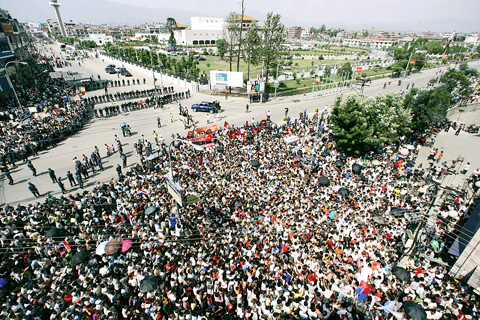Nepal was set for historic change yesterday with a new assembly dominated by former Maoist rebels poised to sweep away the Himalayan kingdom’s 240-year-old monarchy and declare a republic.
The key session, however, was being held up amid wrangling between the former rebels and mainstream political parties over who should be the impoverished nation’s first president, officials said.
Tensions were also rising in the capital, with police using tear gas to disperse protesters demanding that unpopular King Gyanendra be given the boot as scheduled, an AFP reporter at the scene said.

PHOTO: AP
In spite of a ban on gatherings outside the complex where the new constitutional body was set to meet, thousands of people thronged the area to celebrate Nepal’s first “republic day.”
“We are here to put pressure on them to announce a republic quickly,” said Mohan Ghising, 48, a Maoist political worker who was part of group waving large red flags emblazoned with a hammer-and-sickle. “We don’t want them to delay.”
“This is a golden day for Nepal and Nepalese. It’s the end of an era and the start of a new era,” said Sagar, the leader of the Maoists’ Young Communist League, which has mobilized thousands of its supporters.
But last-minute jockeying for places in Nepal’s new political landscape was holding up the historic moment, originally scheduled to take place in the morning.
“The meeting will be further delayed until they reach an agreement,” said Ananta, a deputy commander of the Maoist People’s Liberation Army.
Sources close to the talks said the country’s elderly prime minister, the mainstream politician Girija Prasad Koirala, wanted to be president but that the Maoists were objecting.
The constitutional assembly’s first meeting will be the culmination of a 2006 peace deal that brought the Maoists out of the hills and jungles and into the mainstream.
The Maoists have told Gyanendra and his son, Crown Prince Paras — loathed for his alleged playboy lifestyle — to bow out gracefully or else face “strong punishment.”
Gyanendra was crowned after the 2001 slaying of his popular brother Birendra and most of the royal family during a rampage by a drink-and-drug-fueled crown prince who later killed himself.
Maoist spokesman Krishna Bahadur Mahara said the king would have a deadline of seven to 15 days to vacate the palace. But tensions are high, with police blaming die-hard royalists for a string of small bomb attacks this week.
Although seen by loyalists as the reincarnation of a Hindu god, Gyanendra never managed to win much support from the public, having been falsely seen by many people as somehow involved in the palace killings.
His status was further damaged by his ill-fated decision to seize absolute power to fight the Maoist rebellion.

SECURITY: As China is ‘reshaping’ Hong Kong’s population, Taiwan must raise the eligibility threshold for applications from Hong Kongers, Chiu Chui-cheng said When Hong Kong and Macau citizens apply for residency in Taiwan, it would be under a new category that includes a “national security observation period,” Mainland Affairs Council (MAC) Minister Chiu Chui-cheng (邱垂正) said yesterday. President William Lai (賴清德) on March 13 announced 17 strategies to counter China’s aggression toward Taiwan, including incorporating national security considerations into the review process for residency applications from Hong Kong and Macau citizens. The situation in Hong Kong is constantly changing, Chiu said to media yesterday on the sidelines of the Taipei Technology Run hosted by the Taipei Neihu Technology Park Development Association. With

A US Marine Corps regiment equipped with Naval Strike Missiles (NSM) is set to participate in the upcoming Balikatan 25 exercise in the Luzon Strait, marking the system’s first-ever deployment in the Philippines. US and Philippine officials have separately confirmed that the Navy Marine Expeditionary Ship Interdiction System (NMESIS) — the mobile launch platform for the Naval Strike Missile — would take part in the joint exercise. The missiles are being deployed to “a strategic first island chain chokepoint” in the waters between Taiwan proper and the Philippines, US-based Naval News reported. “The Luzon Strait and Bashi Channel represent a critical access

CARROT AND STICK: While unrelenting in its military threats, China attracted nearly 40,000 Taiwanese to over 400 business events last year Nearly 40,000 Taiwanese last year joined industry events in China, such as conferences and trade fairs, supported by the Chinese government, a study showed yesterday, as Beijing ramps up a charm offensive toward Taipei alongside military pressure. China has long taken a carrot-and-stick approach to Taiwan, threatening it with the prospect of military action while reaching out to those it believes are amenable to Beijing’s point of view. Taiwanese security officials are wary of what they see as Beijing’s influence campaigns to sway public opinion after Taipei and Beijing gradually resumed travel links halted by the COVID-19 pandemic, but the scale of

Pope Francis is be laid to rest on Saturday after lying in state for three days in St Peter’s Basilica, where the faithful are expected to flock to pay their respects to history’s first Latin American pontiff. The cardinals met yesterday in the Vatican’s synod hall to chart the next steps before a conclave begins to choose Francis’ successor, as condolences poured in from around the world. According to current norms, the conclave must begin between May 5 and 10. The cardinals set the funeral for Saturday at 10am in St Peter’s Square, to be celebrated by the dean of the College